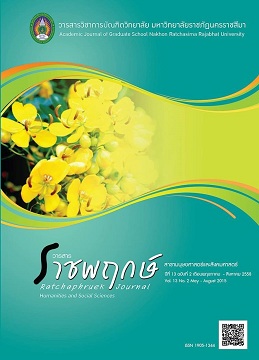การประเมินผลนโยบายรับจำนำมันสำปะหลัง : ศึกษากรณีภาคตะวันออกเฉียงเหนือ
Main Article Content
Abstract
การวิจัยครั้งนี้มีจุดมุ่งหมายเพื่อ 1) ศึกษาการดำเนินนโยบายรับจำนำมันสำปะหลังสามารถบรรลุผลสำเร็จตามวัตถุประสงค์ที่กำหนดไว้หรือ โดยการประเมินผลสัมฤทธิ์ความสำเร็จของนโยบายการรับจำนำมันสำปะหลัง ในระดับ ผลผลิต (Product) ผลลัพธ์ (Outcome) และผลกระทบ (Impact) และ 2) แนวทางการแก้ไขนโยบายรับจำนำมันสำปะหลังให้ประสบความสำเร็จเพิ่มมากขึ้นควรมีแนวทางอย่างไร ผู้วิจัยเน้นรูปแบบการวิจัยเชิงปริมาณ และตรวจสอบความสอดคล้องของข้อมูลด้วยการวิจัยเชิงคุณภาพควบคู่กันไป ผู้วิจัยเก็บข้อมูลโดยใช้แบบสอบถามกับ เกษตรกรผู้ปลูกมันสำปะหลังที่ขึ้นทะเบียนกับกรมส่งเสริมการเกษตร และอาศัยอยู่ในภาคตะวันออกเฉียงเหนือ จำนวน 400 ราย และใช้แบบสัมภาษณ์เชิงลึกกับตัวแทนเกษตรกร ผู้ประกอบการโรงแป้ง-ลานมัน เจ้าหน้าที่องค์การคลังสินค้า เจ้าหน้าที่ธนาคารเพื่อการเกษตรและสหกรณ์การเกษตร และนักการเมืองท้องถิ่น จำนวน 30 ราย
ผลการวิจัย พบว่า 1) การประเมินด้านบริบทของนโยบาย พบว่า เกษตรกรส่วนใหญ่รับรู้ถึงวัตถุประสงค์ของโครงการ และเห็นว่าโครงการสอดคล้องกับสภาพเศรษฐกิจและสังคมปัจจุบันในด้านการแทรกแซงราคา และด้านการสร้างเสถียรภาพราคา 2) การประเมินด้านปัจจัยนำเข้า พบว่า เกษตรกรส่วนใหญ่เห็นว่าเจ้าหน้าที่รัฐอำนวยความสะดวกเป็นอย่างดี สามารถอธิบายรายละเอียดข้อมูลขั้นตอนการดำเนินงาน ตลอดจนมีการดูแลและติดตาม หัวมันสดที่รับจำนำสม่ำเสมอ 3) การประเมินด้านกระบวนการดำเนินงาน พบว่า เกษตรกรส่วนใหญ่ติดตามข่าวสารผ่านหัวหน้ากลุ่มของเกษตรกรหรือผู้นำชุมชนในหมู่บ้าน และเข้าใจต่อรายละเอียดการดำเนินงานตามขั้นตอนได้ในระดับปานกลาง 4) การประเมินด้านผลผลิต พบว่า ผลการเข้าร่วมโครงการของเกษตรกรเป็นไปตามที่คาดหวังเอาไว้ 5) การประเมินด้านผลลัพธ์ พบว่า เกษตรกรมีความพึงพอใจต่อนโยบายอยู่ในระดับมาก 6) ผลการประเมินด้านผลกระทบ พบว่า โครงการส่งผลกระทบต่อเศรษฐกิจ สังคมและสิ่งแวดล้อมอยู่ในระดับมาก ดังนั้น การบริหารจัดการนโยบายรับจำนำมันสำปะหลังควรมีการบูรณาการอย่างมีประสิทธิภาพ และมีระบบสัญญาเตือน หรือการติดตามประเมินผลการดำเนินงานอย่างชัดเจน โดยเฉพาะการสร้างระบบของฐานข้อมูลเพื่อเป็นเครื่องมือประกอบการตัดสินใจทั้งในเชิงนโยบายและการดำเนินงานอย่างต่อเนื่อง ตลอดจนการสนับสนุนด้านราคาต้องไม่ให้เกษตรกรมุ่งรับความช่วยเหลือจากรัฐบาลมากกว่าการเรียนรู้ในการหาทางเพิ่มผลผลิตมันสำปะหลัง โดยการส่งเสริมการผลิตที่ดีและมีคุณภาพ ลดต้นทุนต่อหน่วยในระดับที่เหมาะสม ซึ่งจะทำให้เกษตรกรมีรายได้รวมจากการปลูกมันสำปะหลังเพิ่มขึ้น เพื่อการพัฒนาที่ยั่งยืนและมั่นคงต่อไปในอนาคต
Evaluation of the Public Policy of Sweet Cassavas Pledging: A Study of the Northeast Region’s Pledging
This research aimed to 1) study the policy operation of the pledge of sweet cassavas on the objective achievement or to evaluate the success of this policy in product outcome, impact, and 2) to find guidelines to resolve any problems in the policy which would then be used to enhance the pledge of sweet cassavas policy.
During the course of this study, the researcher used mixed methods of both quantitative and qualitative research to validate the data obtained. Questionnaires with 400 sweet cassavas agriculturists, who were registered with the Department of Agricultural Extension living in North-Eastern Region of Thailand were used in this study and also an in depth interview of 30 participants namely representatives of agriculturists, cassava starch factories, entrepreneurs, public warehouse organization officers, bank for agriculture, agricultural co-operatives officers and local politicians was conducted by the researcher.
The findings showed that 1) The evaluation results on the policy context indicated that most of the agriculturists, knew about the project’s objectives and agreed that the project was related to economic and social conditions in price intervention and stabilization. 2) In respect of input evaluation, it was found that most of agriculturists agreed that government officers supported them and were able to explain in-depth details about the project’s operation and also the follow-up plan of pledged fresh sweet cassavas. 3) On the operation side of the project, the majority of agriculturists accessed the news through their agriculturists’ leaders and also community leaders in the village. The agriculturists understood the policy and were able to follow the operational steps at a moderate level. 4) Product evaluation showed that agriculturists’ participation in the project reached the expected objective. 5) The outcome evaluation also showed that agriculturists were satisfied with the policy at a high level and 6) Impact evaluation indicated that the project affected economic, social and environmental aspects at the same level.
For these reasons, the management of the policy on pledge of sweet cassavas should be effectively implemented, have warning systems in place prior to the policy being implemented and a clear follow-up plan and evaluation, specifically in the development of a database which would then be used as the instrument for making decisions about the policy, and its continual operation.
Agriculturists should not rely on the government to sustain the price of cassavas. On the other hand, they should learn how to increase cassavas production, by producing a good quality product and decrease unit costs, which would then increase income from sweet cassavas production year on year, and would then result in sustainable and stable development in the future.


